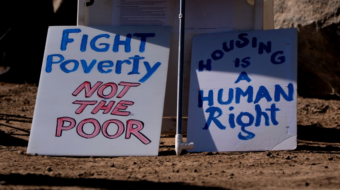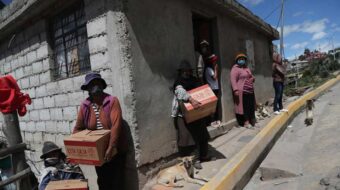
‘Homelessness’ is a ubiquitous term. It’s routinely spoken of on the news, and its victims occupy the streets of nearly every U.S. city and town, so often seen with our eyes and so rarely felt with our hearts. It is all too frequently written off as a sad part of life, yet an unchangeable facet of the way things are. Poverty has become status quo, its effects made grudgingly palatable to the masses with fleeting distractions and hate-fueled division.
It’s not uncommon for working-class people to recognize – even if subconsciously – that the struggle of being homeless is a symptom of a corrupt ruling class that favors the rich and exploits the poor. However, addressing the issue from a place of experience and empathy shines a unique light upon the dilemma, providing a lens through which one can look upon the poor and the displaced with vicarious pain.
One such person is Rep. Cori Bush, D-Mo., who years ago was evicted and had to sleep in her car with her two children. A fierce advocate for the eviction moratorium, her words and her stance come from a place of cold, harsh experience, and perhaps she is among the people best placed to make serious change.
Another person who endured poverty and homelessness is the person writing this article. Between 2004 and 2009, hunger was a common and unwanted guest in my life; I say hunger out of modesty, lest readers see “starvation” and call it embellishment, but very often it truly got that bad. A local pantry and the kindness of neighbors were my primary sources of food, and even then it was scarce. I would sometimes manage to drum up a few dollars for a bag of pasta or a loaf of bread by making shopping trips for residents in the neighboring senior building, or by doing occasional odd jobs for my apartment complex’s maintenance crew.
A can of Coke was a special treat. A slice of pizza or a piece of chicken was extremely rare, as it was more important to make a small amount of money go further by purchasing food that could be stretched out over many days. More often, the cabinets were altogether bare and I would resort to snacking on packets of ketchup just to get a bit of energy. When people think of real hunger, they often don’t realize its accompanying side effects: the dizzy spells, the poor memory, the gnawing feeling inside the stomach.
I thought myself lucky, at least, to have a roof over my head. Then, after a years-long stretch of unpaid rent and the dwindling mercy of the apartment building’s housing authority, we were served a notice of eviction, followed shortly by the eviction itself. It happened at about eight in the morning. A knock at the door and a booming voice the disturbances that tore me from sleep, followed by a rush to get dressed and put as many things as I could think of into a plastic shopping bag, which I’d be taking to…where?
The first few hours were spent in uncertainty, first by sitting in a park trying to think of options, and then by taking shelter in an outhouse during a downpour. That evening was spent sitting on a sidewalk outside a Chinese restaurant; the bitter irony of being outside a place with food while on an empty stomach was not lost on me. I did, however, get a glimpse of the kindness of strangers. A passerby gave me a donut, and I eventually did scrounge up some change the following evening to go into that restaurant and get a single eggroll, which the woman gave me even though I was a few cents short.

Though I only spent three days on the streets, it was more than enough of a glimpse into a life that no human being deserves. The weather so easily wore me down, sending a chill coursing through my body each night, beneath the thin fabric of the hoodie that I’d pull down over my knees, a sorry excuse for a blanket.
I was soon able to go from hard pavement to a homeless shelter, but the two years I spent there were not easy. Your activity was monitored as though you were some kind of prisoner. The discrimination for being poor and homeless permeated the place and extended far beyond into the town in Northwestern New Jersey, where you couldn’t even get a library card, as shelter residents were technically not considered part of the town and not entitled to the basic rights of the rest of the community.
Though I eventually was able to lift myself out of that situation and earn a living, so many people never do. Worse yet, so many face eviction every day, and the downward spiral into displacement and despair that follows. Those who are one missed paycheck away from being on the street – and those who have already ended up there – don’t have a neon sign on them that details their plight. Despite the stigma surrounding the homeless, so many of them would be indistinguishable from any other citizen. Some have a calm demeanor and a ready smile – it’s something I practiced even during the worst of times, but much pain may lie beneath a veneer of outward, friendly contentedness.
To speak and act from experience is to practice a level of human compassion understood primarily from the standpoint of empathy. So the fact that Rep. Cori Bush has chosen to sleep on the steps of the Capitol as she demands that lawmakers act to maintain the national eviction moratorium, shows a willingness to return to what must surely have been the worst time of her life in a show of solidarity toward those in the same predicament.
“The House is at recess,” said Bush. “People are on vacations. How are we on vacation when we have millions of people who could start being evicted tonight? There are people already receiving or who have received pay or vacate notices that will have them out tomorrow. People are already in a position where they need help, our most vulnerable, our most marginalized, those who are in need.”
Perhaps the reason it’s so easy for other politicians not to act on this is the lack of similar experience; the inability to relate with the homeless apart from repeating the tired platitudes so many people use as a way to virtue signal; to display sympathy while lacking actual emotional connection and true understanding. If people like Bush lead the charge in fighting to hold on to eviction moratoriums and combat homelessness from a place of compassion, maybe a few less children will be awoken in the morning to learn they have five minutes to pack a bag and leave. The leaders we elect must take after Rep. Bush and begin to comprehend what being homeless truly means, what it feels like, and why it is inhumane on every level. Until then, their words ring hollow as simply more of the same.










